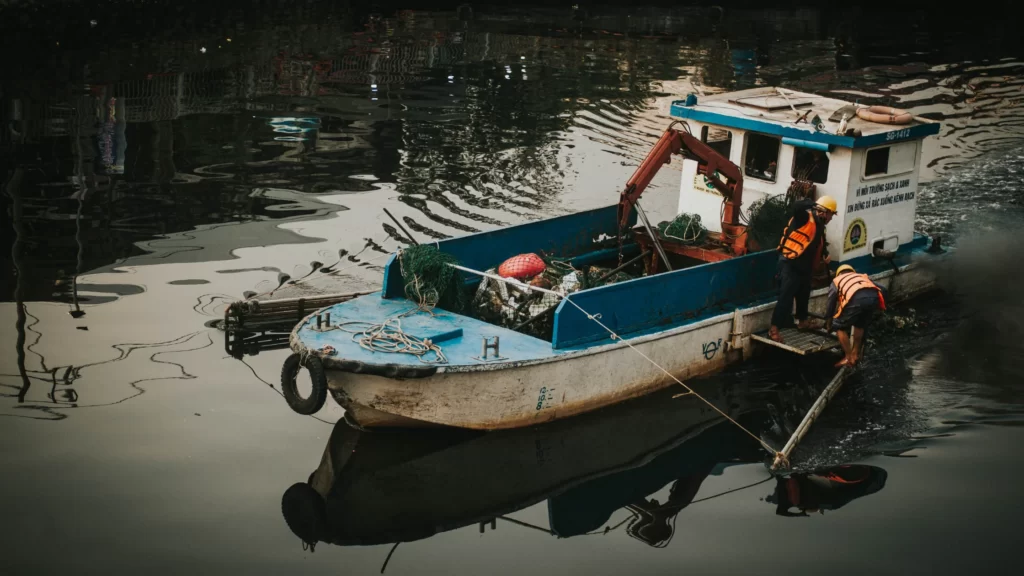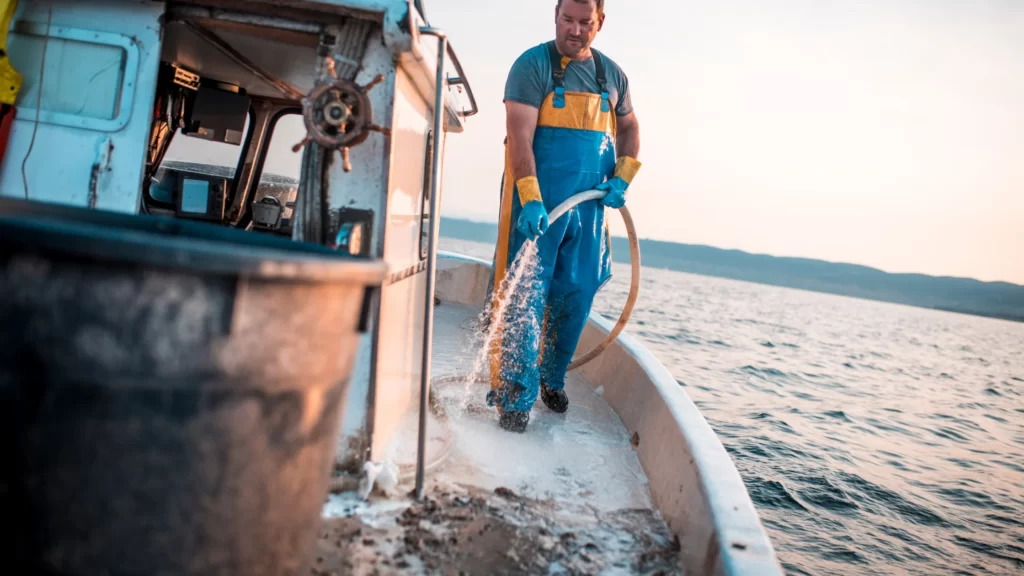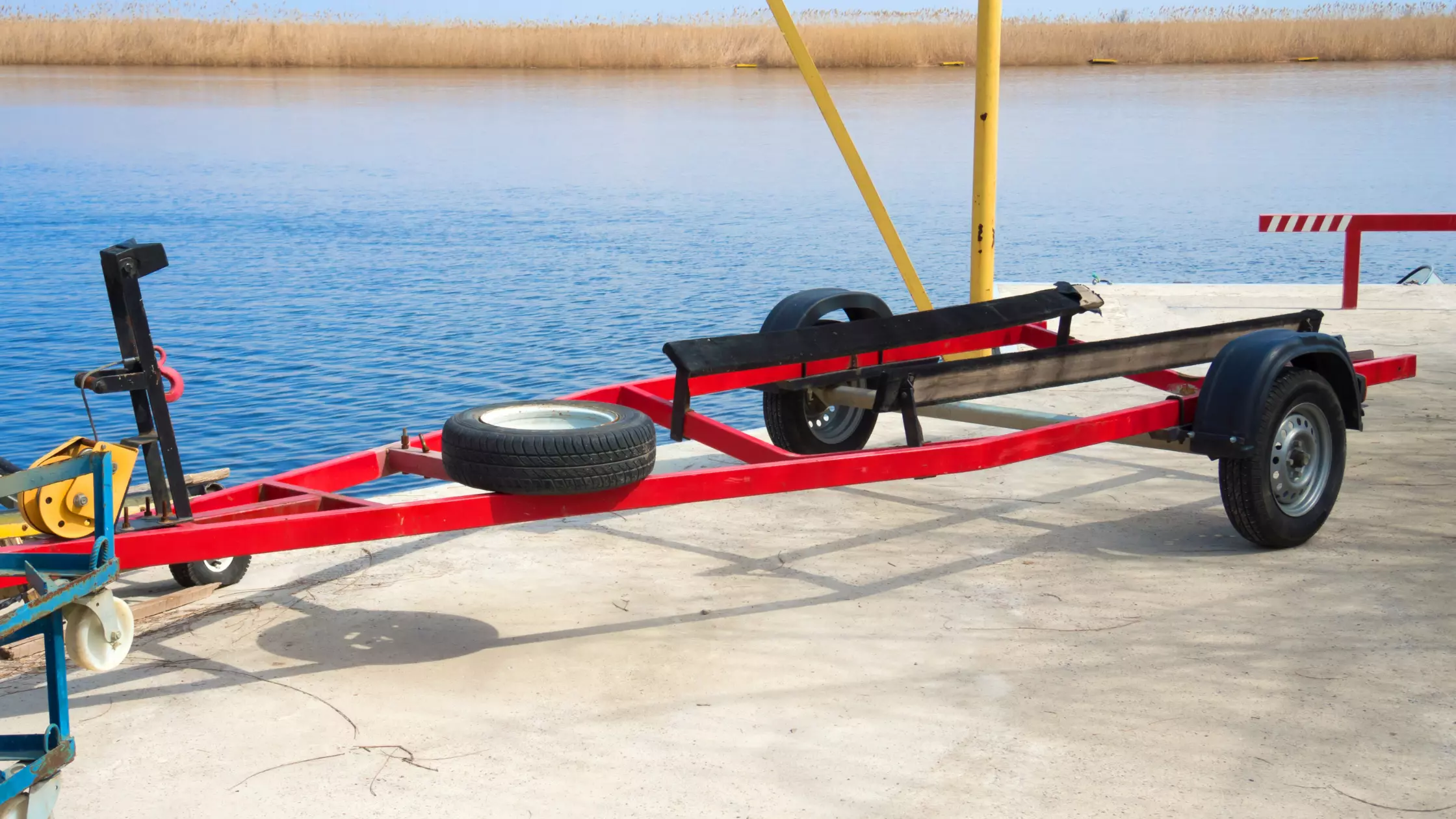How do you clean a boat after saltwater?
Keeping a boat clean in saltwater is the most difficult task.
When saltwater is not properly cleaned, it leaves behind corrosive residue that damages the boat.
Cleaning a boat after it’s been in saltwater is something most of us dread.
When you get out of the water, you should clean your boat seat.
If you clean your boat right after saltwater boating, corrosion and additional damage can be minimized.
You should still thoroughly clean your boat if it’s old.
A boat’s materials can be damaged by saltwater, which is why it is important to keep them clean when necessary.
How to Wash Your Boat?
Here’s a 15-minute guide to help you clean and remove from seat of salt crystals on your boat.
In this guide, we’re going to look at how to properly clean a boat after using it in saltwater.
How Do You Clean A Boat After Saltwater
Items To Used For Cleaning A Boat
Steps Of How Do You Clean A Boat After Salt Water?

Before launching your boat, use a flat surface and make sure to avoid areas with turbulent water.
Remove any items you don’t want to get wet such as food/gear before proceeding.
It is recommended that you wear protective gear, including gloves, apron, and goggles at all times.
This protects your eyes and body from any accidental chemical spillages you might face.
It’s important that you make sure your boat battery is off and disconnected before getting washed.
Disconnecting the cord will help ensure thorough cleaning of your boat.
Leaving your boat without rinsing saltwater off regularly will result in corrosion.
It’s best to rinse both internally and externally as often as you can to reduce the incidence of corrosion.
After you’re done being on the water for the day, make sure to rinse your boat with fresh water and flush out saltwater from the engine.
Cleaning your engine prevents decay between trips.
Rub salt off of cleaned surfaces while they are still wet.
After the water has evaporated, it is much harder to remove the salt.
First, use high-quality good boat soap. The best good boat soap for you will help you clean your boat exterior.
I would advise you to avoid cleaning the upper areas of your vessel first,
Because doing so may dirty the already clean surfaces.
That’s right, not only will you reduce the level of salt and dirt accumulating on the boat’s surface but you’ll also avoid accidentally reapplying it at some point down the line.
Use a lot of freshwaters to clean your boat and use a squeegee to ensure that the gel coat remains intact.
Get a steel brush and scrub the carpeted floor of your boat.
It should not be too hard to clean off the wood, dry surface.
Scrub carefully so you don’t tear up the boat’s carpeting.
If you’re not careful, your only option will be expensive repairs.
To check for barnacle build-up, salt erosion, or other types of wear and tear, wax and polish your hull 2-3 times per season to keep it looking sleek.
It is still possible to find well-maintained boats with gel coat paint.
Cleaning and polishing your boat regularly, however, can help to make sure it doesn’t get damaged and increase its resale value in the future.
How Do You Clean A Boat After Salt Water Fishing?

The saltwater from the ocean can be highly corrosive and damaging to your boat.
It will leave a white residue on the boat, which is not only unsightly but also dangerous.
Saltwater fishing is also a great way to spend time with family and friends.
But, after the fishing trip is over, there are some things that need to be taken care of.
The boat needs to be cleaned and dried before it can be stored for the next use.
The process of cleaning a boat after saltwater fishing is not an easy task.
There are many different ways to do it, depending on how much time you want to invest and what kind of equipment you have available.
There are some cleaning tips you can take to make the process easier and more effective.
How to Clean A Boat After Salt Water Fishing With Vinegar

You will need:
- White vinegar
- Water
- Bucket
- Scrub brush and/or cloth
Use this basic mixture to clean your boat in general. One cup of white vinegar and a gallon of water should be combined in a bucket. Get rid of filth and grime by cleaning surfaces with a scrub brush or cloth. Water the place down.
How To Clean Inboard Boat Engine After Salt Water?

The saltwater is corrosive and will eat away at the metal.
The boat engine will be one of the most important things to clean after spending time in saltwater.
Most boat engines are made of aluminum, which is not as corrosive as steel.
Aluminum is also lighter, which means it won’t take as much work to clean the engine.
Saltwater makes it easier for corrosion to form on any metal object that it touches.
Corrosion can cause a lot of damage to your boat engine if you don’t take care of it right away.
How To Clean A Pontoon Boat After Salt Water?

One of the most common things that people do with their pontoon boat and deck is to take it out on the water.
Saltwater can be a great way to clean and preserve your boat, but you need to know how to properly clean it afterward.
You can start by removing all of the electronics and taking them inside.
You should also remove any gear that is not waterproof and store it inside as well.
Next, you will want to remove any cushions, life jackets, or other items that are not waterproof.
If there are any chairs or benches on your pontoon, you will also want to remove those and store them indoors as well.
Next, you will want to go ahead and wash off all of the deckings with a hose or pressure washer.
It is important to clean the boat after it has been in saltwater.
Here are some more steps
Storing Boat After Cleaning Salt Off Boat

In order to preserve the good condition of your boat, it’s important to store a boat after cleaning the salt off the boat.
Check out these best practices for storing a boat after washing and drying it.
You should always rinse your boat off with fresh water and then let the boat dry before storing it.
How To Clean Your Boat After Use?
We will show you how to properly clean a boat after each use in saltwater.
The best way to start is by inspecting the hull of the boat for any signs of corrosion.
You also want to make sure that all the deck fittings are tight.
This includes all screws, bolts, and nuts.
If you find corrosion, then you need to scrub it off with a stiff brush and water.
For deck fittings that need tightening, use a wrench or screwdriver and tighten them up.
If there is any rust on the propeller shafts or other metal parts then use sandpaper or steel wool to get rid of it before applying a protective coating such as wax or paint.
Once everything has been inspected and repaired, then you should rinse the boat off with fresh water from a hose before.
How To Prevent Damage From Saltwater Exposure?

Saltwater is a corrosive substance that can cause damage to boats, cars, and other items.
The salt in salt water can cause rusting and corrosion on metal surfaces.
The water can also corrode rubber seals or gaskets. It can also leave stains on wood or fiberglass surfaces.
In order to prevent damage from saltwater exposure,
It is best to rinse off the boat with fresh water after coming back from a trip to the ocean or other salty bodies of water.
It is also important to use freshwater for washing down the boat after each trip as well as for rinsing off any gear that comes into contact with salt water.
How To Dry Your Boat After It’s Washed
If you have a boat, there’s nothing better than taking it out on the water.
But what do you do after it’s been washed?
- A tarp and a fan are the best way to dry your boat.
- You should first find a place where your boat can be dried by the sun.
- Next, lay a tarp down and top it with your fan.
- You can then lay the wet side of your boat over the tarp and allow the sun to dry it!
Can I Wash My Boat With Salt Water?

You just need to make sure that you use it in the right way.
You should rinse your boat with fresh water first.
Saltwater will damage the paint or metal of your boat if it is not rinsed off.
After you rinse off the saltwater, you should wash your boat with fresh water and a mild soap or detergent.
Rinse off that soap or detergent as well before drying your boat with a towel or chamois cloth.
How To Clean Boat Engine After Salt Water?
Assuming you want tips on how to clean a boat engine after salt water exposure:
Final Thought
Cleaning a boat and maintaining a boat can be challenging.
As boat owners cannot avoid getting their boats wet, they must take care of them.
Nonetheless, saltwater can cause it to deteriorate over time.
In order to prevent the boat from getting damaged by saltwater, the owner must clean and dry it after each use.
Here are some helpful tips regarding how to clean your boat after you use saltwater to minimize the corrosive effects of saltwater during the coming boating season.
Frequently Asked Questions
Does salt water ruin boats?
How do you neutralize salt on a boat?
Another method is by using vinegar or lemon juice baking soda and water, which will form an alkaline solution that helps remove salt from boats as well as other surfaces like concrete floors, tile grout, etc.








